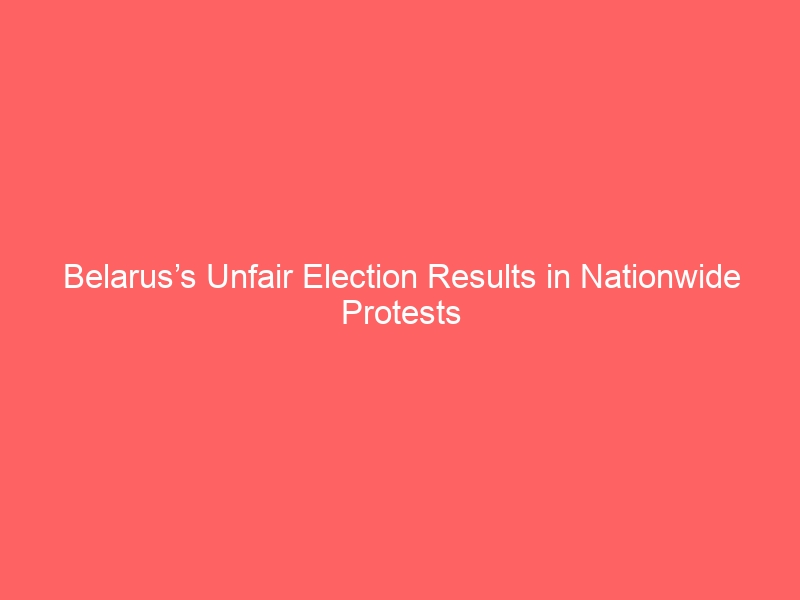Caeleigh Stamper reports on Belarus’s recent rigged election and the protests that have ensued, as well as the government’s response.
By Caeleigh Stamper Credit: The Myriad News
Belarus election suspected to be rigged, won by 26-year authoritative President Alexander Lukashenko.
The results of Belarus’s recent election, an alleged win for President Alexander Lukashenko by 80 percent, have been challenged by his main opponent Sviatlana Tsikhanouskaya. After his 26 years in office and a major decline in support, Tsikhanouskaya and a number of Belarusians believe Lukashenko has rigged the election to be in his favor.
“I believe my own eyes, the majority was for us,” Tsikhanouskaya stated on Monday in a news conference according to CNN.
After the results were announced, Tsikhanouskaya left Belarus for Lithuania, where she is staying with her children to ensure their safety, according to a video of hers reposted by the BBC.
According to an article for Euractiv, “main opponents are either imprisoned, barred from registration or driven out of the country.” It is suspected that Tsikhanouskaya has received threats from Lukashenko and has been forced to flee Belarus for the protection of herself and her family.
Citizens of Belarus take to the streets to protest Lukashenko — over 6,000 arrested.
After the election’s results were announced on August 9, protests began breaking out in major cities across Belarus. Lukashenko has never received this much backlash, further reinforcing the claims that his support was nowhere near the 80 percent that he insists he received.
This would not be Lukashenko’s first unfair election. According to the New York Times, after winning his third term in 2006, he publically admitted that he had falsified the election. This was before Lukashenko’s support significantly waned, but even then he was met with a few scattered protests.
“In terms of the elections that Lukashenko’s held, there’s been nothing like it. It seems to me that the whole country really is in favor of change,” University of Alberta professor and expert on Belarus told the Guardian.
The mainly peaceful protests that sprung up have been met with violence from Belarus’s police. Tear gas, stun grenades, rubber bullets and live fire have been used against protestors with support from authorities. According to the BBC, two protestors have died and at least 200 others have been injured. Over 6,000 protestors have been arrested.
The future of Belarus’s government remains unclear.
Lukashenko remains firm and refuses to acknowledge any corruption within the recent election, as well as many of the elections he has won since 1995 — all of which the Organisation for Security and Co-operation in Europe has not recognized to be free and fair. With continuing protests against him as well as his response to support violence against his own citizens for speaking out, the future of Belarus’s government and Lukashenko’s role in it has not yet been determined and will likely be unstable.
Russian President Vladimir Putin and Chinese President Xi Jinping have congratulated Lukashenko and voiced their support, according to CNN. Both Putin and Xi have passed constitutional measures in their own countries to ensure a continuation of their ruling, and have worked to suppress the backlash from their citizens by arresting and threatening protestors.
“UN chief António Guterres has urged all relevant parties to avoid actions that would further enflame [sic] tensions, and to approach the issues in the spirit of dialogue,” according to the United Nations.
Despite Guterres’s request for other countries to avoid intervening at all with Belarus, the continuation of protests could result in Russian interference. Russia and Belarus have tight military relations and Russia operates a number of military bases in Belarus. This could put pressure on western powers to intervene as well, risking either conflict with Russia or standing by as Putin gains influence over another country, similar to what happened with eastern Ukraine.
“If the uprising gathers strength and momentum, the chance of Russia moving to bolster the Belarusian security forces increases,” reports Deborah Haynes for Sky News. “But even if the streets can be calmed, such an unprecedented outpouring of dissent, as has been seen, might make it impossible for President Lukashenko to see out his full term.”
